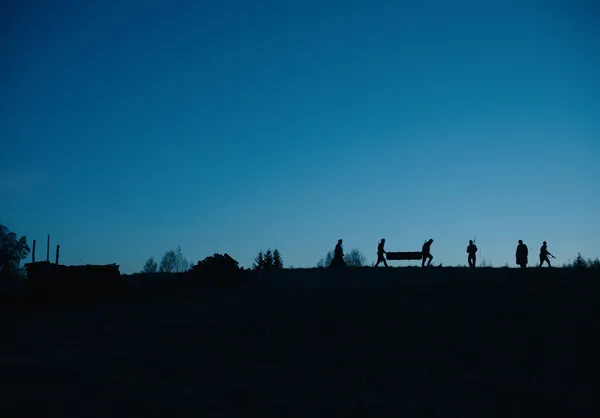 |
| Burial |
In director Ben Parker's Burial, Harriet (Anna Marshall), an old woman, watches the news reports of the collapse of the Soviet Union. Her quiet Christmas Eve is disturbed when a young violent neo-Nazi breaks into her house, demanding that she gives him what he knows she has.
Instead, she recounts the events from May of 1945, when intelligence officer Brana Vasilyeva (Charlotte Vega), her younger self, led a group of Soviet troops on a mission to transport Hitler's remains to Stalin.
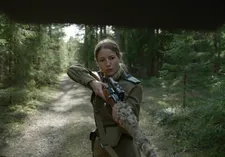 |
| Charlotte Vega in Burial |
Transposing the claustrophobic tension of Parker's underwater début feature The Chamber, for the dying days of the Second World War, Vasilyeva and her unit try to fend off attacks from German Werewolves. Burial is a story as much about one woman struggling with a mission that challenges her moral boundaries, as it is a timely reflection on the recurring cycles of toxic ideologies.
Speaking with Eye For Film ahead of the world première at Arrow Video Frightfest, Parker and Vega discussed revisiting an unfamiliar true story, how history is forgotten across the generations, and the need to remember and openly discuss the past.
Paul Risker: To begin, do you perceive anything that connects Burial with The Chamber?
Ben Parker: Some of the similarities are militaresque characters coming up against a brick wall of ideology. In The Chamber, there were characters that had to come to terms with their gung-ho attitude – of things not panning out the way that they thought. In Burial, Charlotte's character has to come to terms with the orders of her mission - the moral decision on top of the mission.
… I'll have a complete departure on the next film that will hopefully not have anything to do with the military, or war, or anything.
PR: What was the seed of the idea behind the story, and for Charlotte, what drew her interest in the script?
BP: The genesis of the idea was coming across a story of how they [the Russians] found Hitler’s remains and verified them, and then smuggled them out of Berlin. I'd never heard that before and when you come across a true story that no one has heard of, or few people have, you instantly think, ‘Maybe there's something there.’
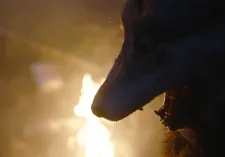 |
| Nazi soldiers presenting themselves as Werewolves |
As it grew into a script, I wanted to talk about some of the things that are going on in the world today – propaganda, people lying, burying the truth and urging people to do things that are maybe not moralistically right. What was nice through the true story and the script that we wrote was the central character is someone who is conflicted - a Jewish character asked to verify the remains of Hitler. I could see the inherent conflict and that was what was appealing to me.
Charlotte Vega: What attracted me to the script was I'd never been sent anything like that. I'd never been close to an opportunity of playing a role like that. These aren't roles that come by often for women.
Once I started doing a little research and I spoke to Ben, and he told me more about what inspired the story, I was fascinated. What I knew about that period of history was what I was taught in secondary school, which is a lot, but it didn't go into the myths and the German Werewolves. It didn't go into depth about the Soviet army and the amount of women who fought in the war and all of their stories.
It was interesting to be able to do some research and read some books – The Unwomanly Face Of War, and Memoirs Of A Wartime Interpreter, which Ben recommended. I fully immersed myself in the whole thing and because I connected with Ben's vision and after watching The Chamber, seeing that he writes strong female leads well and they work, I wanted to jump into it.
PR: There are gaps in our knowledge about the past and it’s impossible to cover everything in a history curriculum. This however is problematic.
BP: With the Second World War there's a lot of holes in terms of the morality and the horror that went on. You can tell the day-by-day story of the war, but it's more than you can tell a young person. You need to have a note afterwards that says, "Please look a little more into this because the true horror of this event in history, which shouldn't be revered, needs to be remembered that way.”
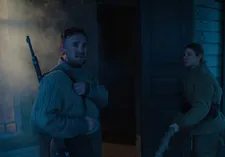 |
| Seeking shelter |
We actually had a note in the edit because someone wondered whether there’s anyone that wouldn’t know who Hitler was? I laughed at that because he’s one of the most evil figures in history. I thought everybody knows who Hitler is over a certain age, but it brought up an interesting point. You don't want to tell kids under a certain age about Hitler, so it's valid in some ways. Fortunately the film is a 15, and I think everybody over the age of 15 knows who Hitler is.
The most important thing is how it starts. You can say there was a big war at some point and grandfathers and great-grandfathers fought in that conflict. Drilling down on how that starts is something that has come up in the last five years, where horrible things are going on in the world. It leads people to think that it's not far-fetched that we could fall back into that, and those are the things we need to remember - not only that grandfather and great-grandfather fought in a war.
PR: Our historical and cultural awareness can be victim of bias. Burial could challenge the audience’s preconceptions that are a product of these moral holes.
BP: We find ourselves in an interesting position because when I wrote it, I wanted to talk about how the Russian soldiers were not particularly nice people as they pushed through Poland and Germany. I was worried at the time, thinking Russia's a big market for selling films, and I didn't want to be too harsh. Now we find ourselves in a position where we're not being harsh enough and I'm asked questions, "Why did you say this about the Russians?”
This is the point - the film talks about the moral compass of doing what's right. If you're getting orders to kill people, or you feel you’re having to do something wrong, then that moral compass should be listened to.
I was fascinated by the Russian side of history, from what I learned outside of the curriculum in school. We [Britain] handed a load of White Russians back to the Red Russians, who were in turn sent to Gulags and killed. It's a sad part of history, but you can't avoid the violence and the horror that was enacted through these soldiers. It's difficult to talk about, but it's something people should discuss, and it’s going on now.
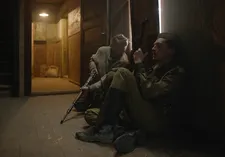 |
| Under siege |
CV: ... You can't predict situations and history repeats itself all the time. We're talking about the personal stories of those people and that doesn't have to be specific to any country, or any war. It's relative in any era, so hopefully that's what comes across.
It helps that the characters are flawed in their own way and no one is saying that anybody's perfect, or doing the right thing from the beginning to the end. Brana, especially, has that conflict to figure out throughout. I think that's real and people can relate to it.
PR: Towards the film’s end, you address the idea of ideology and the difficulty of ridding our world of it. Our present day bears witness to this, as we see the threat of recurring cycles of violence perpetuated by dangerous ideologies.
BP: One of Charlotte's lines spoke most to that - she wants this to be out in the open and she wants to bleach his [Hitler’s] bones in the sun. You can carry on with an ideology and think what you think, but as long as it's exposed and given the light of day, then hopefully without burying and hiding stuff, people can make a normal decision about these things.
It’s not straightforward anymore to expose political leaders for their lies, and say they can't be trusted. The way you treat liars and people who tell stories to get you to do stuff, is by showing that they wouldn't be willing to do the same things as you would, or what they want you to do. It's not Trump going out there and building that wall himself.
The aspect of Brana saying, “I want to see him as a coward”, is if you show someone up as a coward, then it strips away their aura of being a great leader. If it came out that Hitler died shooting himself, it would be a horrible image to conjure up, and it would strip him of an aura of leadership.
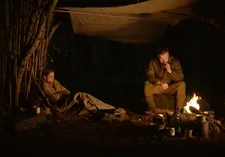 |
| On mission |
PR: Director Oliver Hirschbiegel’s Downfall has the capacity to provoke a sympathy for Hitler. That is not to say it excuses his heinous actions, but the film is able to convey the tragedy of how deeply one man lost his humanity. It’s a challenging film that requires a willingness to engage in an unsettling character study.
BP: One of Harriet’s lines at the beginning of the film is “History isn't written by the victors, it's remembered by the survivors.” When you are so far away from an event and there’s no one around that survived it, then you start forgetting. Human beings are built that way - we're designed for our memory to fade so that we can move past trauma and tragedy. The problem is generations are losing their memory of something.
There’s a reason it's comedy and tragedy because tragedy is the most horrible flip of comedy and happiness. […] It was tragic that this guy was a coward and didn't actually have a plan for taking over the world. He killed all of his own people in order to do that. It’s tragic and it shouldn't be repeated.
CV: It's why films are great because we have this incredible platform to show different sides of people. In history, like Ben says, things get forgotten across generations, and then you're just remembering the essence - the black and the white, that this was wrong and this was right, that they were the goodies and they were the baddies.
When you make films you can take a look at those people and see them as a person, see their inner conflict and what they had to go through. It's all about empathy and there's no black and white, or right and wrong. There's just egos and conflicts, and going down the wrong road.
PR: Could we describe the film as a Trojan Horse – an entertaining story with a message?
BP: I hope people take more than entertainment from the film and come away talking about it. At the same time it can sometimes feel weird to be talking about a big moment in history, and a serious topic in an entertaining way.
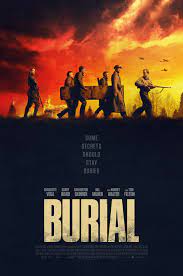 |
| Burial poster |
I'm half and half. Sometimes I can feel embarrassed about how I've turned something tragic into an entertainment, but then the reason we did it was to say, "Here’s another story.” It brings up topics that are going on in the world right now. Hopefully you can watch it as entertainment, and you can come away from it with some questions and thinking about some things.
PR: In spite of the conflict this approach can provoke, it speaks to how films find ways to engage and disarm the audience.
BP: It’s one of the reasons we had the bookends of Harriet's character telling you the story. It's leading you through this story via someone's testimony. It's not me as a filmmaker saying, "Here’s an hour and a half of 1945.” We come in through the eyes of a character. Hopefully that leads the audience to listen to a survivor’s testimony.
It must have been difficult for you Charlotte having that flip - you're character as an older version, that presented all of its own interesting elements to telling the story.
CV: ... That part was interesting because Harriet is telling the story, and she's going to be much harder on herself looking back with all those regrets. She’s looking at everything that went wrong and she's been living with that story for years - all the loss and grief, and so that influences how she tells the story.
Burial had its World Premiere at Arrow Video Frightfest 2022. It will be released by 101 Films on Sky, iTunes and Amazon from 12 September 2022, and then available on digital from 26 September 2022.





















